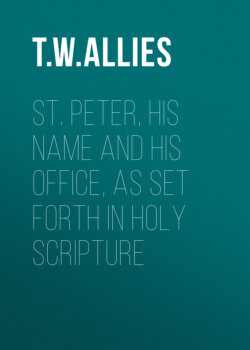| Points in question, generally, inequality in the Apostolic College: |
| specially, the appointment of one over the rest; resolution of these tried |
| by four examinations:—1. Into the words and acts of Christ; which relate |
| to the Apostles.—2. Into those which seem to mark the institution of |
| a singular authority.—3. Into the mode of writing used by the |
| evangelists.—4. Into the history of the rising Church.—A |
| concurrence of these four points would prove the two questions | 200 |
| The analysis of what has been written shows this concurrence | 201 |
| Twelve arguments from what has been written, proving the inequality of |
| the Apostolic college, and Peter's Primacy | 203 |
| What is the force and nature of the Primacy.—Six proofs establishing |
| this to consist in superior jurisdiction | 209 |
| Enquiry into the end and purpose of the Primacy: for the knowledge of |
| the intention and purpose equivalent at least to a negative rule, |
| ascertaining what must be given to it | 212 |
| Three classes of reasons, typical, analogical, and real, ascertain for us this |
| purpose.—1. Typical. Parallel of Peter with Abraham and its results | 213 |
| Parallel of Peter with Judah and its results | 214 |
| ii. Analogical. Analogy of body, house, kingdom, city, and fold, and its |
| results.—And of universal, and each particular Church on one hand, |
| and Primate and bishops on the other | 217 |
| iii. Real, whether educed from texts containing the institution of the |
| Primacy, or from the inherent properties of the Church.—1. Educed |
| from texts | 219 |
| 2. Educed from properties of the Church; first, its identity; secondly, its |
| unity; thirdly, its catholicity; scriptural setting forth of unity | 220 |
| Further illustration from Protestant opinions of the Church's unity.— |
| A. First, that of Anglicans, of unity in particular Churches, but not in |
| the universal Church, represented by Dodwell | 222 |
| B. Second opinion, set forth by Vitringa, of distinction between the |
| necessity of internal and that of external unity | 225 |
| C. Third opinion, of agreement in fundamentals | 232 |
| Two causes of this being held, one theoretical, the other practical.—The |
| former stated | 233 |
| The practical cause | 234 |
| Reasons educed, thirdly, from the Catholicity of the Church, with which |
| the Primacy is bound up.—Catholicity has two parts, one material and |
| one formal | 236 |
| The material part, amplitude and extension.—The formal part, not only |
| negative, but affirmative.—Negative, as expelling from the one true |
| Church all heretics and schismatics: testimonies to it | 237 |
| Affirmative, at making a coherent body with members and articulations | 238 |
| Testimonies to the mode of this coherence, in Irenæus, Cyprian, and |
| Tertullian, and the other Fathers, summed up in S. Leo | 239 |
| Hence answers to the question whether the doctrine of S. Peter's Primacy |
| is contained in the creed.—It is involved in one Catholic Church | 243 |
